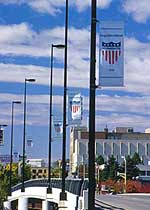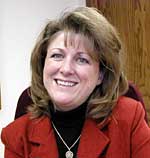Safety in smaller numbers
By Bob Reha
Minnesota Public Radio
December 10, 2001
|
| RealAudio |
The image of small cities in rural America is often the stuff of humor. The punch line for jokes - they're isolated communities where nothing much happens. Small cities and towns are a good place to leave. But some of that perception may be changing. Since Sept. 11, some people are realizing they can find the good life by coming home to the Midwest.
| |
|
|
|
||
Small cities have always struggled to play in the big leagues. In the world of arts and culture, shopping and sports, bigger is better.
In the world of economic development, cities are classified in three groups. The first tier includes New York, Chicago, Los Angeles. In the second tier are places like the Twin Cities, St. Louis and Kansas City. Then there's the third tier - smaller cities that are geographically isolated. Places like Fargo-Moorhead and Sioux Falls. These cities have worked hard for new businesses. But that appears to be changing.
"Being isolated or being out of the line of fire - so to speak - not having a big bull's eye on the place, is probably a positive right now," according to Joel Kotkin, author of The New Geography.
Kotkin says it's not just a technical revolution that's changing how people live and work.
"On a very human level, I think there are many people living in large cities who feel more vulnerable," says Kotkin. "They want to live someplace that they consider safer, and of course the new telecommunications technologies allow that to happen much easier."
Carrie Ward can best be described as cheerful. She seems to have a permanent smile. Ward is a native of North Dakota, and lives in Fargo. She's pleased to be back home in a city she likes with a job she enjoys. Ward is marketing manager for www.careerlinknorth.com.
The Web site's name says it all. There are careers to be had, up north. The Web site was developed by employers in the region to lure homegrown talent back home. Ward markets the site to 85,000 alumni from North Dakota and northwest Minnesota. People can find job listings or post their resumes here. Since Sept. 11 the Web site has become very popular.
"The week after Sept. 11 we saw an increase of 40,000 hits on our Web site, along with a number of e-mails," says Ward. "I have received a number of e-mails of people saying, 'What's going on back home? I'm really considering (coming) back if there's an opportunity for me.'"
|
"I think there are many people living in large cities who feel more vulnerable. They want to live someplace that they consider safer."
- Author Joel Kotkin |
Ward says the majority of inquiries came from the East Coast. She says traffic on the site averages 150,000 hits a week. Traffic is still running about 20,000 hits a week above normal. Ward says e-mails indicate people are willing to make less money to feel safer.
It's a situation Ward understands very well. She and her husband moved back to Fargo from the Twin Cities seven years ago. The prospect of a good job was the initial reason. The couple thought they'd stay a few years and move on to bigger and better things. But the plan has changed.
"We decided that Fargo was the place that we wanted to to have a family and to continue to live," Ward says. "We felt we put down some pretty solid roots. We knew a lot of people, we're very pleased with the school system and what Fargo had to offer, and we were seeing some real growth."
Ward says that growth gives her family more to do. The city is home to a successful Northern League baseball team. Top musical performers come to the FargoDome. There's a healthy arts community. The area is shedding its image as a hick town. Ward says that's important, but since the Sept. 11 attacks, her priorities have shifted. Family is what's important now.
"We were very happy that they decided to move back," says Carrie's mother, Annette Mears. "The family connection is closer when your children are closer," she says.
Five of Mears' six children live close to the family home in Rolla, N.D., near the Canadian border. Mears says it's comforting to have her children closer to home.
"You always worry about your children, no matter where they live. But living in areas where there is more violence and more crime - one does worry more," Mears says. "There is a safety factor in knowing that they are in areas that are more safe than other parts of the country."
| |
|
|
|
||
Small towns have always been the place for old people to retire. They're a place 20-somethings can't wait to leave. But Carrie Ward says that might be changing.
"It's not about money, and it's not about material things. Now it's about families and where I want to grow up," says Ward. "It's about crime or no crime, and I think that's really what's luring people back here - that they do have so many good things to offer in those different arenas."
Ward says sponsors of the CareerLink North Web site will take their recruiting efforts beyond cyberspace. Twice over the holidays, local businesses will host cocktail receptions. Their hope is to get young career professionals to move back to the Red River Valley.
"We're real interested to see the traffic that will attend these. If we see numbers that are a lot higher then we've seen in the past two or three years, it would have to be a direct result of the events that have happened," says Ward.
So far, no businesses have relocated to rural areas because of the terrorist attacks. But Carrie Ward believes what's happening with the CareerLink North Web site could show the beginnings of that trend - a population shift from urban cities to rural towns.
The safety issue is a hot topic now for economic development, according to Don Berg, a business recruiter for the Fargo-Cass County Economic Development Corporation. Berg says, in some big cities seminars and conferences focus on how not to lose businesses - how to reassure people it's safe to stay put. But Berg is doubtful recent events will trigger a mass exodus to rural America.
"I do not think that we will have a big windfall because of the terrorist attacks, but I do think it will help - definitely," says Berg. "One gentleman mentioned a three-year to five-year window. I would agree with that. I think within the next six months you're going to start seeing some of those businesses move out of the larger cities."
Berg says smaller cities in rural areas have always marketed safety as a recruiting tool. He says the terrorist attacks have reminded people that a safe environment is a valuable commodity.


